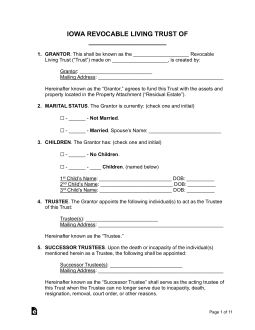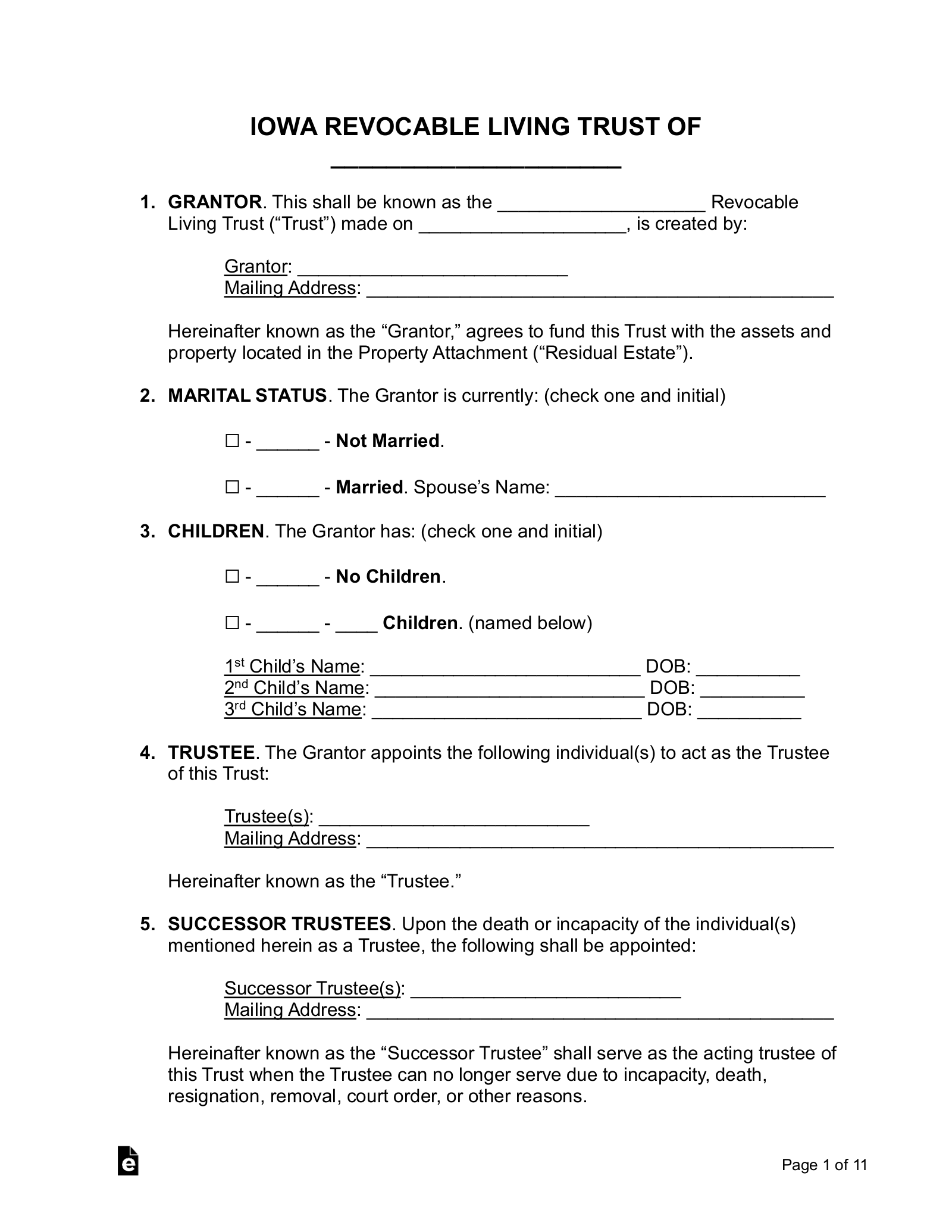Updated March 27, 2024
An Iowa living trust is a document that allows a grantor to determine how their property will be distributed upon their death. A living trust is not subject to the probate process, meaning the beneficiaries of the trust will immediately receive their allotted assets when the grantor dies. With a living trust, the grantor may also serve as their own trustee.
Requirements (5)
- Competent: The grantor must have the mental capacity to establish a trust.
- Intent: The grantor must indicate the intention to create a trust.
- Sole Trustee Cannot be the Sole Beneficiary: A sole trustee cannot also be the sole beneficiary of the trust.
- Definite Beneficiary: Unless it is a charitable trust or a trust for pets, the trust must have a definitely ascertainable beneficiary.
- Trustee’s Duties: The trustee must have identifiable duties to perform.[1]
Registration
There is no statewide law that requires a living trust in Iowa to be registered.
Laws
Amending/Revoking – So long as the grantor is competent, they may revoke or modify a revocable trust.[2]
Bond Requirement – A trustee is not required to put forward a bond unless this is a requirement under the terms of the trust, or they have been ordered to give a bond by the court.[3]
Certification of Trust – To establish the trust’s existence or terms, or the authority of the trustee, a trustee may provide a person with a certification of trust instead of a copy of the trust instrument.[4] The certification must be signed, dated, and certified, and it must state the names of all the currently acting trustees.[5]
Co-Trustees – Unless the terms of the trust specify otherwise, any power held by multiple trustees may be exercised by majority decision.[6] If co-trustees are unable to reach a majority decision, they may petition the court to resolve the impasse.[7]
Contesting a Trust – A proceeding to contest the validity of a trust must be commenced within a year of the grantor’s death, or within the period specified in any notice given by the trustee following the grantor’s death.[8]
Costs Related to the Trust – In administering a trust, the trustee may only incur costs that are reasonable given the trust’s property and intended purpose.[9]
Jurisdiction – A trust is valid if it was created in compliance with the laws of the jurisdiction where the trust instrument was executed or where the grantor was living at the time of its creation.[10]
Oral Trusts – Oral trusts that have not been reduced to writing as specified under Iowa state law are not enforceable.[11]
Pet Trusts – A trust for the care of an animal that is alive at the time of the grantor’s death is valid. The trust terminates when the animal being cared for by the trust is no longer alive.[12]
Signing Requirements – For a trust to be valid, the trust instrument must be written and signed by either the grantor or the trustee, or an authorized agent of the same.[13]
Spendthrift Provision – For a spendthrift provision to validly restrain the transfer, assignment, or encumbrance of a beneficiary’s interest, the terms of the trust must specify that the interest is held subject to a “spendthrift trust,” or use similar language.[14]
Trustee’s Compensation – A trustee is entitled to reasonable compensation, unless the terms of the trust specify the amount of the trustee’s compensation.[15]
Trustee’s Duties – A trustee has a duty to prudently administer the trust in accordance with its terms and with Iowa law.[16] The trustee is also required to manage the trust solely in the interest of its beneficiaries.[17]
Trustee’s Powers – In addition to those powers conferred by the terms of the trust, a trustee is empowered to perform any necessary action to properly manage, invest, and distribute the trust property.[18]


